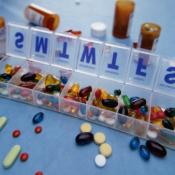 The number of children taking psychiatric medications has been rising over the last few decades. In 2014, the National Center for Health Statistics estimated 1 in 13 U.S. children between the ages of 6 and 17 takes medication. Many people believed the report was clear evidence that children are overmedicated. Yet a new study challenges that argument.
The number of children taking psychiatric medications has been rising over the last few decades. In 2014, the National Center for Health Statistics estimated 1 in 13 U.S. children between the ages of 6 and 17 takes medication. Many people believed the report was clear evidence that children are overmedicated. Yet a new study challenges that argument.
According to a study published in the Journal of Child and Adolescent Psychopharmacology, children are not overprescribed psychiatric drugs. Instead, the research suggests children who need psychiatric drugs might not be getting them.
Psychiatric Drug Use in Children
Some people are concerned about the overuse of psychiatric drugs, particularly stimulants such as Ritalin and Adderall. They often cite the increase in drug use as evidence of a problem. Others argue it is possible that more children are developing psychiatric conditions. The increase in drug use could be proportional to the new need.
To analyze the issue, researchers investigated the number of children with a mental health diagnosis. Then they compared that figure to the number of children who are prescribed psychiatric drugs.
Researchers gathered data on 6,351,482 people aged 3-24 years from the IMS LifeLink LRx National Longitudinal Prescription Database. Next, they analyzed prescription rates of three drug classes: antidepressants, stimulants, and antipsychotics. The annual percentage of young people who took drugs in any of the three classes was as follows:
- Ages 3-5 years: 0.8%
- Ages 6-12 years: 5.4%
- Ages 13-18 years: 7.7%
- Ages 19-24 years: 6.0%
Next, researchers compared the known prevalence rates of various psychiatric conditions to the rate at which drugs for these conditions were prescribed. They found that prescription rates are lower than diagnosis rates. For example, about 1 in 8 teens experiences depression each year, but less than 1 in 30 were prescribed antidepressants. About 1 in 12 children have symptoms of ADHD each year, though only 1 in 20 received a stimulant prescription during the study year.
Not all children who have a psychiatric diagnosis need medication. However, the very low rates of medication use suggest children who need medication might not be receiving it.
References:
- Post by former NIMH Director Thomas Insel: Are children overmedicated? (2014, June 06). NIMH. Retrieved from https://www.nimh.nih.gov/about/directors/thomas-insel/blog/2014/are-children-overmedicated.shtml#2
- Sultan, R. S., Correll, C. U., Schoenbaum, M., King, M., Walkup, J. T., & Olfson, M. (2018). National patterns of commonly prescribed psychotropic medications to young people. Journal of Child and Adolescent Psychopharmacology. doi:10.1089/cap.2017.0077

The preceding article was solely written by the author named above. Any views and opinions expressed are not necessarily shared by GoodTherapy.org. Questions or concerns about the preceding article can be directed to the author or posted as a comment below.

 Is Medication Compliance an Issue? Think Outside the Pillbox
Is Medication Compliance an Issue? Think Outside the Pillbox Self-Care Tips for Parents of Special Needs Children
Self-Care Tips for Parents of Special Needs Children How to Help Children and Teens with ADHD Stay on Task
How to Help Children and Teens with ADHD Stay on Task

Please fill out all required fields to submit your message.
Invalid Email Address.
Please confirm that you are human.
Leave a Comment
By commenting you acknowledge acceptance of GoodTherapy.org's Terms and Conditions of Use.